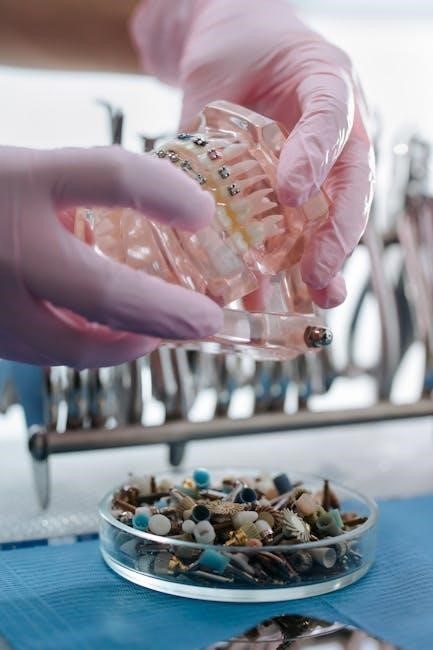Proper post-operative care is crucial for successful dental implant healing. These instructions guide patients through recovery, minimizing complications and ensuring optimal results. Following them carefully promotes healing and long-term implant success.
Importance of Following Post-Op Care
Adhering to post-operative instructions is essential for the success of dental implant surgery. Proper care minimizes complications, such as infection or implant failure, and ensures a smooth recovery. Ignoring these guidelines can lead to prolonged healing times, discomfort, or even the need for additional procedures. By following the recommended steps, patients can reduce swelling, manage pain effectively, and promote optimal bone integration around the implant. Consistency in post-op care also helps maintain oral hygiene, preventing issues like peri-implantitis. Ultimately, careful adherence to instructions ensures the implant functions and looks as intended, providing long-term oral health and confidence.
Overview of the Healing Process
The healing process after dental implant surgery occurs in stages, with the initial recovery lasting about 1-2 weeks. During this time, the body begins to heal the surgical site, and swelling typically subsides within 7-10 days. Bone integration, a critical phase, occurs over 3-6 months, where the implant fuses with the jawbone. Proper care during this period is vital to ensure osseointegration, the process by which the implant becomes stable. Full recovery and readiness for the final restoration can take up to 6 months, depending on individual healing rates. Following post-op instructions closely supports this natural healing timeline and ensures the implant becomes a durable, long-lasting solution.

Immediate Post-Surgery Care
After implant surgery, avoid rinsing, spitting, or disturbing the wound. Use ice packs to reduce swelling and rest with your head elevated to promote healing.
Bleeding Management and Control
Some bleeding after implant surgery is normal. To manage it, bite firmly on the gauze for 30-60 minutes. If bleeding continues, replace the gauze or use a moist tea bag. Avoid spitting, rinsing, or disturbing the wound, as this can dislodge the clot. Rest and keep your head elevated to reduce bleeding. If bleeding is heavy or persistent, contact your dentist immediately. Minor oozing may occur for 24-48 hours. Stick to soft foods and avoid hot liquids to minimize irritation. Proper bleeding control promotes healing and prevents complications.
Rest and Activity Level Recommendations
Rest is essential after implant surgery to promote healing. Avoid strenuous activities for 24-48 hours and limit physical exertion for 3-5 days. Elevate your head with pillows while resting or sleeping to reduce swelling. Avoid bending, lifting, or exercising, as these can dislodge the blood clot or cause bleeding. Plan to rest for the first day and gradually resume light activities. Overexertion may lead to discomfort or complications. By adhering to these guidelines, you support the healing process and minimize the risk of post-operative issues. Proper rest ensures the implant integrates well and reduces recovery time.
Swelling and Bruising Expectations
Swelling and bruising are common after implant surgery, often peaking 24-48 hours post-procedure. Ice packs applied to the affected area can help minimize swelling. Keeping your head elevated while resting or sleeping also reduces swelling. Bruising may appear a few days after surgery and typically fades within a week. These symptoms are temporary and part of the healing process. Most patients experience mild to moderate swelling, which subsides within 7-10 days. If swelling or bruising worsens, contact your dentist for guidance. Proper care, including rest and elevation, ensures these symptoms resolve naturally, supporting a smooth recovery.

Pain and Discomfort Management
Pain and discomfort after implant surgery are usually mild and temporary, managed effectively with rest, ice, and following post-op instructions for a smooth recovery.
Medications and Dosage Instructions
Medications are prescribed to manage pain and prevent infection after implant surgery. Pain relievers, such as ibuprofen or acetaminophen, are typically recommended, while antibiotics may be prescribed to reduce infection risk. Always follow the dosage instructions provided by your dentist or surgeon. Do not exceed the recommended dose and complete the full course of antibiotics if prescribed. Avoid mixing medications with alcohol, as this can interfere with healing. If you experience severe pain or unusual side effects, contact your dentist immediately. Proper medication adherence ensures a smooth recovery and prevents complications.
Non-Medication Strategies for Pain Relief
Besides medications, several non-medication strategies can help manage discomfort after implant surgery. Applying an ice pack to the outside of your cheek near the surgical site can reduce swelling and ease pain. Resting and avoiding strenuous activities is also crucial, as overexertion can worsen discomfort. Eating soft, cold foods like yogurt or smoothies can be soothing and prevent irritation. Staying hydrated is important, but avoid hot liquids for the first few days. Gently rinsing with warm salt water (1/2 teaspoon per cup) can also help clean the area without causing pain. These strategies complement medication and promote healing without additional side effects.

Nutrition and Dietary Recommendations
A soft food diet is essential after implant surgery to avoid discomfort and promote healing. Focus on cold or lukewarm, easy-to-chew foods like yogurt, smoothies, and soups. Hydration is key, but avoid hot liquids for the first few days. Stick to gentle, non-irritating options to ensure a smooth recovery and protect the implant site.
Soft Food Diet Guidelines
After implant surgery, a soft food diet is recommended to minimize discomfort and prevent irritation at the surgical site. Opt for cold or lukewarm foods like yogurt, smoothies, and pudding, as they are gentle on the mouth. Avoid hot, spicy, or hard foods that could disrupt healing. Soft-cooked vegetables, scrambled eggs, and mashed potatoes are also excellent choices. Chewing should be gentle, and patients should avoid biting directly on the implant site. Liquids, such as soups or milkshakes, can be included but should not be too hot. This dietary approach helps protect the implant and supports a smooth recovery process during the initial healing phase.
Fluid Intake and Avoidance of Hot Liquids
Staying hydrated is essential after implant surgery, but it’s important to avoid hot liquids for the first 24-48 hours. Hot beverages can irritate the surgical site and delay healing. Opt for lukewarm or cool fluids, such as water, herbal teas, or cold soups. Avoid using straws, as the suction can dislodge the blood clot and cause bleeding. Instead, sip directly from a cup. Cold fluids can also help reduce swelling and discomfort. Avoiding hot liquids ensures a smoother recovery and protects the implant site from unnecessary stress. Proper hydration supports the healing process and maintains oral health during the post-operative period.

Oral Hygiene and Wound Care
Keep the mouth clean to promote healing. Gently rinse with warm salt water or prescribed mouthwash, avoiding direct contact with the implant site. Avoid disturbing the wound to prevent irritation and ensure proper recovery. Use soft-bristle toothbrushes and mild toothpaste, focusing on areas away from the surgical site. Maintaining good oral hygiene reduces infection risks and supports implant success.
Cleaning the Implant Site
Cleaning the Implant Site
Gentle cleaning is essential to prevent infection and promote healing. For the first 24 hours, avoid rinsing or disturbing the implant site. Starting the next day, rinse with warm salt water (1/2 teaspoon per cup) 2-3 times daily. If prescribed, use Peridex or antiseptic mouthwash as directed. Gently brush the area with a soft-bristle toothbrush, but avoid direct contact with the implant or sutures. Do not use harsh toothpaste or abrasive products. For bleeding or discomfort, apply gentle pressure with a clean gauze. Maintain meticulous oral hygiene to reduce infection risks and ensure proper healing of the implant site.
Recommended Oral Care Products
Using the right oral care products is vital for maintaining implant site hygiene. A soft-bristle toothbrush is ideal for gently cleaning around the implant without causing irritation. Antiseptic mouthwashes, such as Peridex, can be prescribed to reduce bacteria and promote healing. Mild, non-abrasive toothpaste is recommended to avoid irritating the surgical site. Saline solution (1/2 teaspoon of salt in warm water) is effective for rinsing and soothing the area. Avoid harsh products containing alcohol or strong chemicals. Interdental brushes may be used for gentle cleaning around the implant, but only as directed by your dentist. Always choose products that are gentle on tissues and compatible with the healing process.

Follow-Up Care and Monitoring
Regular follow-up appointments are essential to monitor healing progress and ensure proper implant integration. Your dentist will assess the site and address any concerns promptly.
Signs of Infection or Complications
Monitor for signs of infection, such as fever, redness, swelling, or pus around the implant site. Severe pain, persistent bleeding, or a bad taste in the mouth may indicate complications. If you notice unusual symptoms like implant mobility or difficulty opening your mouth, contact your dentist immediately. Early detection of issues ensures timely intervention, preventing prolonged discomfort or implant failure. Keep track of any changes and report them during follow-up appointments to ensure proper healing and implant success.
Importance of Scheduled Appointments
Keeping scheduled appointments is vital for monitoring the healing progress of your dental implant. These visits allow your dentist to assess implant stability, ensure proper integration with the bone, and address any concerns early. Regular check-ups help prevent complications and confirm that the implant is healing as expected. Follow-ups also provide opportunities to remove sutures or adjust components. By attending these appointments, you ensure the implant functions optimally and achieves long-term success. Consistency in post-operative care appointments is key to a smooth recovery and a successful outcome.

Additional Tips for Optimal Healing
Avoid smoking and alcohol to promote recovery. Ensure adequate rest and maintain a soft diet to minimize discomfort. Gentle oral care and hydration also support healing.
Smoking and Alcohol Avoidance
Smoking significantly delays healing by reducing blood flow and introducing toxins that harm healing tissues. Avoid smoking for at least 2 weeks post-surgery to minimize risks of implant failure. Alcohol should also be avoided, as it can interfere with medications, slow recovery, and increase bleeding risks. Both habits can impair the body’s ability to heal, leading to complications such as infection or implant rejection. Adhering to these guidelines is essential for optimal recovery and long-term success of your dental implant.
- Smoking: Avoid for 2 weeks to prevent delayed healing and implant failure.
- Alcohol: Avoid to reduce bleeding risks and ensure proper recovery.
Importance of Rest and Recovery
Rest is crucial after implant surgery to promote healing and minimize complications. Avoid strenuous activities for the first 24-48 hours to prevent bleeding and discomfort. Sleep with your head elevated using pillows to reduce swelling. Plan for a few days of minimal exertion to allow your body to recover. Overexertion can delay healing and increase the risk of post-operative issues. Proper rest helps stabilize the implant and ensures a smoother recovery process.
- Avoid physical activity for 24-48 hours post-surgery.
- Sleep with head elevated to reduce swelling.
- Plan for rest to support healing and implant stability.


